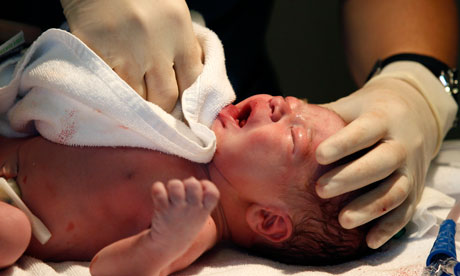
Turkey has become the first country to make elective caesarean sections punishable by law, threatening fines for doctors who persuade women to have surgery deemed unnecessary.
President Abdullah Gül approved a law that permits caesareans only in the "case of a medical emergency", and imposes fines of up to 1,000 lira (£355) on doctors who persuade women to go under the knife unnecessarily.
Turkey has one of the world's highest caesarean rates, with the procedure accounting for about 48% of births. According to the health ministry, up to 70% of all births in some private hospitals involve caesareans. The ministry accuses doctors of pushing women towards the operations out of greed – they cost 1,000 lira more than natural births in some private hospitals.
However, the medical community is concerned that the law does not get to the core of the problem. Ismail Mete Itil, president of the Turkish Gynaecologist and Obstetrics Association, said: "Two years ago, our association presented a comprehensive programme, aimed at the improvement [of obstetrics] to the health ministry. But nothing has been done to put our suggestions into practice."
The report recommended an increase in births supported by midwives, educational campaigns in the media, the increased availability of pain relief and legal efforts to reduce doctors' fear of malpractice cases in order to lower the caesarean rate to 35% by 2013. Itil added: "How can the government pass a law before even trying to implement any of these suggestions?"
At a conference in May the prime minister, Recep Tayyip Erdoğan, spoke out against abortions and caesareans and, referring to a generally lower birthrate among women who had had caesareans, called the procedure "a secret plot" aimed at slowing Turkey's growth. Erdoğan has campaigned for population growth and urges Turkish couples to have at least three children.
Itil added that the rate for c-sections had increased worldwide: "There are many reasons for this. For example women in developed countries are on average older when they have their first child now, which can lead to complications, and malpractice lawsuits are especially high for births. With c-sections, doctors feel they have more control over what happens."
The Chamber of Medical Doctors in Ankara said that the commercialisation of the health sector was also to blame for the fact that the caesarean rate had almost doubled since the AKP government implemented a comprehensive privatisation programme in 2003.
According to Itil, pain relief in childbirth needed to be promoted as well. "Fear of pain pushes some women to opt for elective caesareans. This can be avoided if women and doctors are educated about possibilities to ease the pain without surgery."
He said the law would require psychological reports for women who wanted a c-section, to find out if the fear was "pathological" and surgery thus justified. "This will just add to the pressure."
Selda Campling, whose daughter was born in October 2011, was scheduled for a natural birth but ended up having a caesarean: "After four hours in labour, the birth canal just did not open enough, and the pain became unbearable so the doctor decided to operate."
She thinks the procedure should not be a way for private hospitals to make money, but needed to be available in case of complications.
Itil is concerned that doctors might not be ready to opt for surgery once the law is in place: "How can a law decide when a patient requires a certain treatment? This is against medical ethics, and the art of medicine in general. Turkey will set a very negative example with this law."

